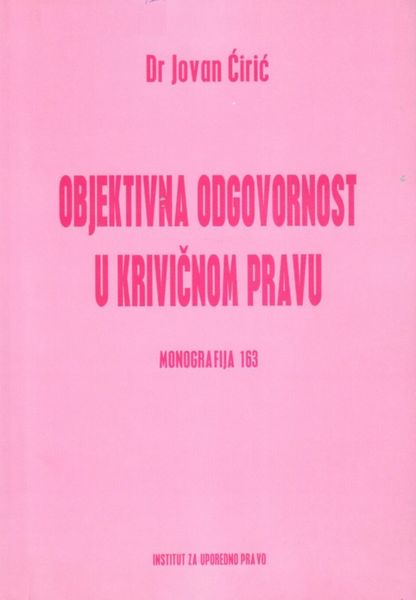
We kindly inform you that, as long as the subject affiliation of our 300.000+ articles is in progress, you might get unsufficient or no results on your third level or second level search. In this case, please broaden your search criteria.

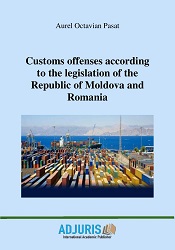
Crime as a phenomenon has a wide expansion in the customs field, causing considerable losses to the state interests of the Republic of Moldova and Romania. Control over the transport of goods and cultural and historical values across the customs border is one of the most important activities of law enforcement. A real danger to the social and state interests is represented by well-established and functional schemes of smuggling of drugs, weapons and ammunition, nuclear materials, import of counterfeit goods, including low-quality consumer products. The importance of this book lies in the fact that the judicial analysis of the customs offenses was carried out based on the generalization of the practical experience accumulated by the Republic of Moldova and Romania under specific social and legal conditions. We are firmly convinced that this work can constitute a solid scientific and methodological support for the literature, especially for the further development of the science of criminal law. Based on their own approaches, obviously formed by the analysis of the theoretical conceptions of the scientists in the researched field, new research orientations are prefigured. Similarly, the importance of this book lies in the possibility of contributing to the improvement of the existing incriminating framework in the field of customs offenses.
More...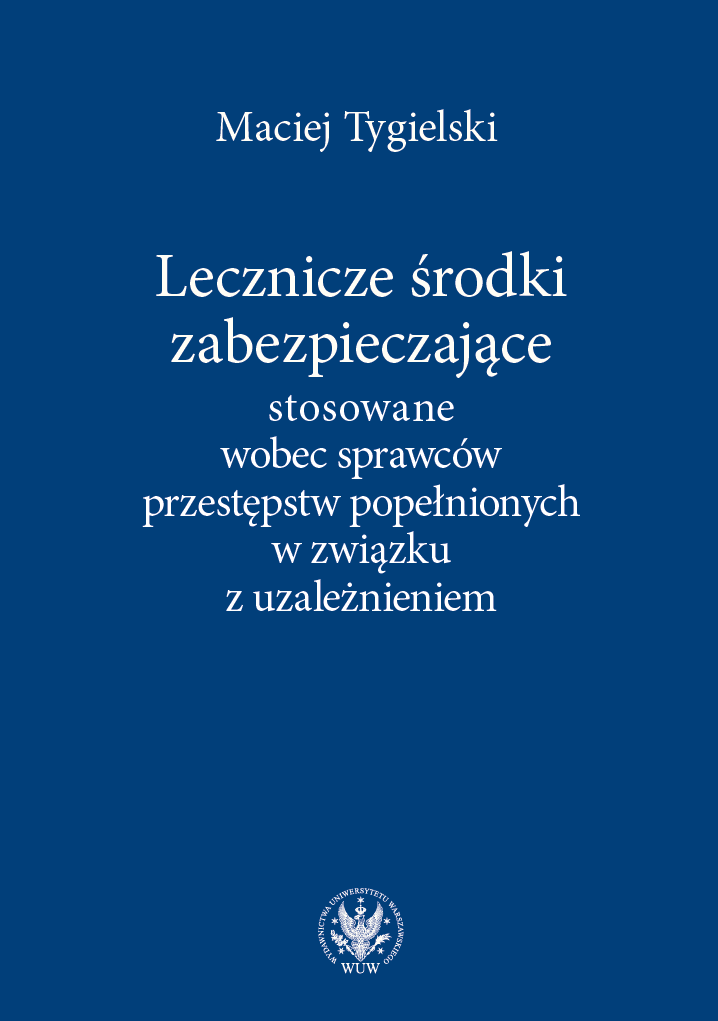
The author presents the directions of changes in proceedings dealing with convicts for crimes committed in connection with addiction. He presents the evolution of security measures applied to these types of perpetrators, and assesses the accuracy of the adopted statutory solutions.
More...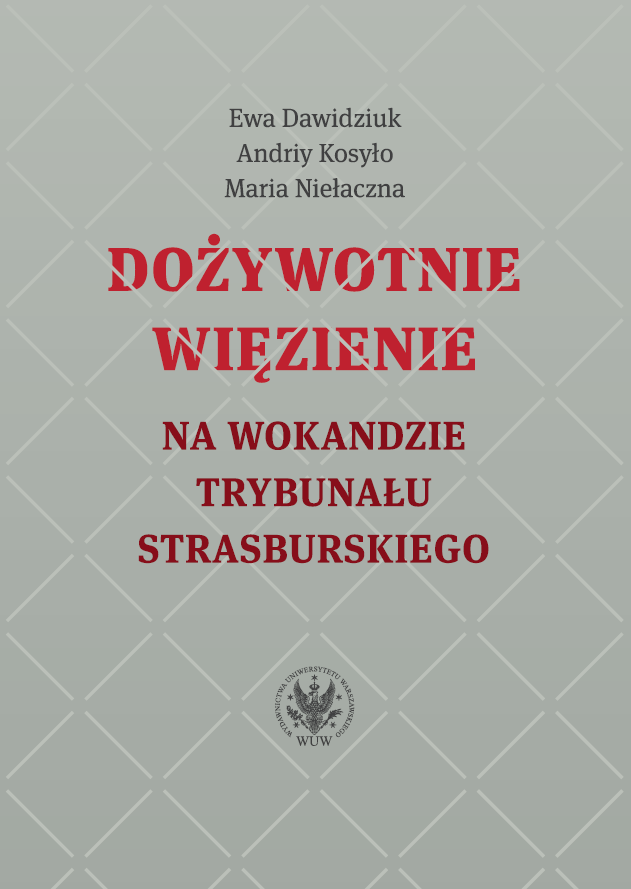
The authors analyse various aspects of life imprisonment sentence from the soft law perspective and examine the Strasbourg Court judgements issued in cases submitted by prisoners serving such sentences. They describe cases which indicate problems connected not only with this most severe punishment. They emphasise the fact that administering absolute life sentence without the possibility of conditional release is in contradiction to the imposed punishment.
More...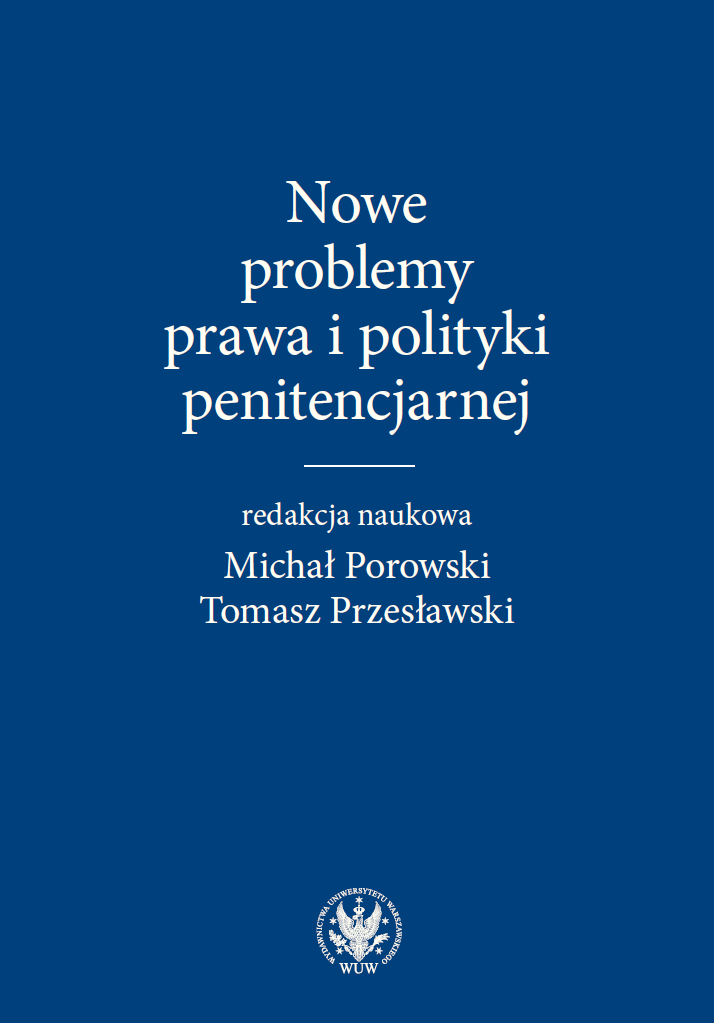
A collection of articles showing the directions of development of modern penitentiary policy and new problems related to the execution of imprisonment, which appeared in Poland in connection with the political changes of the last 25 years, and in the world - in connection with the pursuit of the widest possible consideration of human rights in dealing with convicts. Penitentiary policy was presented as knowledge belonging to the broadly understood humanities and drawing inspiration from it, because recently there has been a tendency in the literature to identify penitentiary policy with dogmatics and doctrine of executive criminal law, which limits its scope to the juridical aspects of punishment execution. The authors pay attention to axiological premises, social processes, cultural changes and practical solutions that sanction the norms of executive criminal law and the rules of dealing with convicts. The Department of Penitentiary Law and Policy was established in October 1962 at the Faculty of Law of the University of Wrocław on the initiative of Professor Stanisław Walczak. It was the first scientific and research center dealing with prison issues in Poland, located within university structures. In this way, the postulate of many generations of penitentiaries who, from the mid-nineteenth century, made efforts to make this field of knowledge an independent scientific discipline and to introduce it to the group of humanities and academic education programs, was fulfilled. Less than three years later, the Department of the same name was established at the Faculty of Law of the University of Warsaw, also thanks to the efforts of Professor Stanisław Walczak, who was not only its head, but also a teacher and patron of the generation of penitentiaries educated at universities. In 1972, the Department became part of the then newly established Institute of Social Prevention and Rehabilitation at the University of Warsaw, where to this day its employees continue the work started 50 years ago.
More...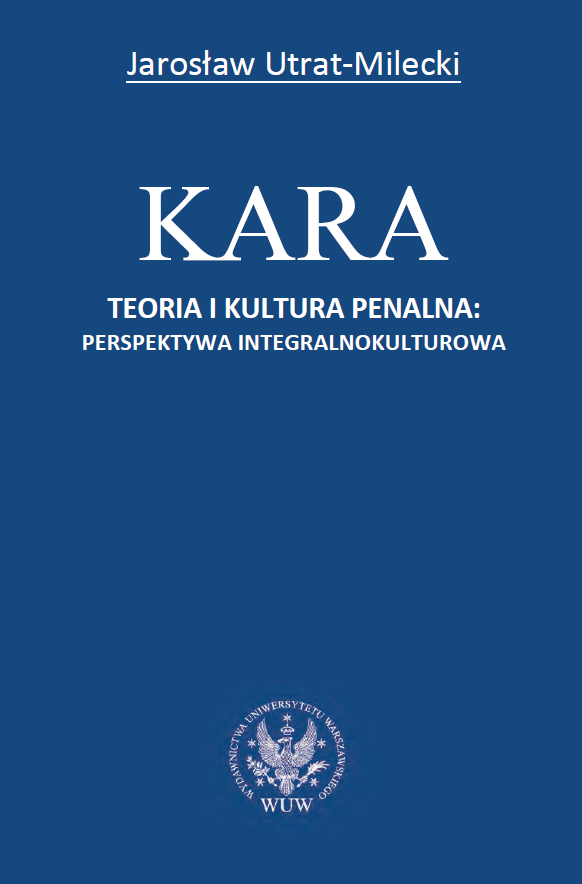
A monographic study in the field of penology, i.e. the science of punishment and punishment. It presents the problem of punishment from a broad perspective of the philosophy and sociology of law, in the context of contemporary mechanisms of social control.The book is a comprehensive penological study of punishment theory and penal culture. The issue of criminal punishment is presented in the context of criminal law science, but also shows, from a sociological and penitentiary perspective, the relationship between criminal punishment and penal law and the more general problem of institutionalizing violence in social life.
More...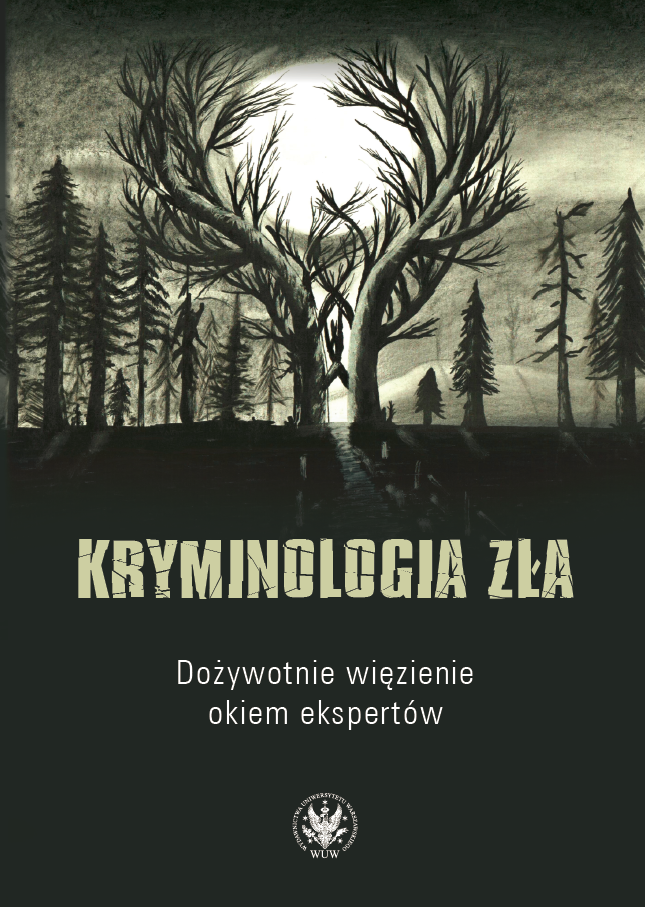
The first part of the book contains experts’ opinions about passing life imprisonment sentence as well as researching and diagnosing the convicts. The second, empirical part contains case studies of the convicted. The publication concentrates on murderers and habitual criminals, who are often not susceptible to resocialisation.
More...
The author attempts to address the problem of using digital evidence in Polish criminal trial from the perspective of the third decade of the 21st century. He discusses technical as well as penal and procedural issues, considering the need to reconcile theory and practice. Digital evidence, a frequent component of contemporary criminal proceedings, is an extremely complicated matter from the perspective of forensic science. The reflections are supported by empirical data obtained during 2019 research, which was conducted through analysis of the final court proceedings.
More...
The report on the low number of forced labour cases in Poland, implemented by the Council of the Baltic Sea States within the CAPE Project (Competence Building, Assistance Provision and Prosecution of Labour Exploitation Cases in the Baltic Sea Region). It is a preliminary report, which answers the question put by the commissioning party and draws attention to numerous weaknesses of the Polish system counteracting labour exploitation. The study was conducted in collaboration with key institutions responsible for eliminating human trafficking in Poland. The publication discusses the results of the examination of official documents, selected court rulings, about 400 press articles, 25 interviews and the public opinion survey report. It recognizes the legal and factual situation as of 31 December 2020.
More...
The issue addressed in this article has become topical with the entry into force of the new criminal procedure code and the increasingly frequent legislative amendments. In practice, it is more and more often observed that absolute or relative nullities are invoked, even before the appeals court, that intervened during the preliminary chamber procedure, but were not invoked until the start of the trial phase before the first instance. Or, in this situation, the question arises to what extent, after the start of the trial, there is the possibility of returning the case to the preliminary chamber as a result of finding a case of absolute nullity. Ab initio, it is necessarily to specify the non-existence in the current legislation of the possibility of declaring extraordinary appeals against the conclusion of the preliminary chamber, regardless of the defects of legality that could be identified. However, in the absence of an appeal, the need to identify an effective procedural remedy is required in the event of a case of absolute nullity which, normally, should be reflected in the conclusion of the preliminary chamber. By Decision of the Constitutional Court no. 802/2017, it was ruled that the legislative solution contained in art. 345 paragraph (1) of the Code of Criminal Procedure, which does not allow the judge of the preliminary chamber, in the resolution of requests and exceptions made or exceptions raised ex officio, to administer other means of evidence other than "any new documents presented" is unconstitutional. Also, by the Decision of the Constitutional Court no. 88/2019 it was ruled that the provisions of art. 281 para. (4) lit. a) from the Code of Criminal Procedure referred to art. 281 para. (1) lit. f) from the same normative act are unconstitutional.
More...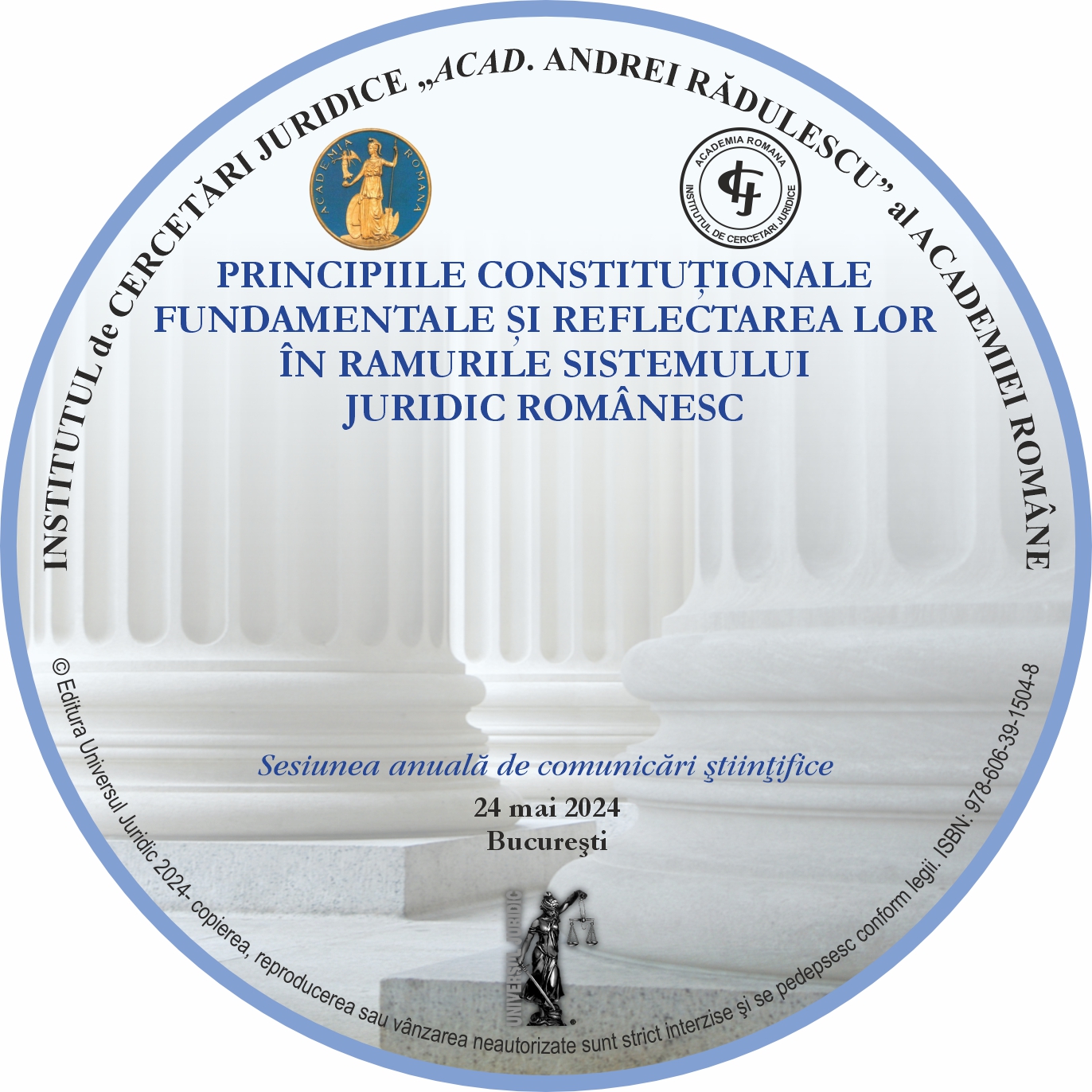
The present scientific approach aims to elucidate the issue of deducting the period of preventive detention or the period served from the sentence imposed by a foreign judgment in the hypothesis of concurrent offences or recidivism for an offence committed in Romania by a Romanian citizen. In the case of multiple offences, the problem arises of deducting from the resulting penalty the period of detention (whether under preventive or house arrest or the period served of a penalty imposed by a foreign judgment, especially since the latter judgment was rendered in a Member State. We intend to clarify whether, from this point of view, the solution pronounced by the Constitutional Court in its decision No 433 of 2021 or the texts of Law No 302 of 2004 on international judicial cooperation in criminal matters is questionable. In this study, we will consider that some texts of the special law should be amended, as they are no longer up to date in view of the fact that in the case of multiple offences and after recognition of the foreign judgment, the period of detention must be deducted, regardless of whether the sentence has been served or deemed to have been served, and the need to formulate a proposal for a lege ferenda.
More...
Having its origin in Roman law and being formulated in its established version, nullum crimen, nulla poena sine praevia lege poenali (by Feuerbach), the principle of legality has always aimed to prevent arbitrariness in the field of criminal law. From this point of view, in light of the fact that criminal law is substantially defined by the content given to it through interpretation, it is natural that the principle of legality plays an essential role in preventing arbitrariness in the context of judicial interpretation. At the same time, the restrictions arising from the requirements of the principle of legality have constantly collided, over time, with the need for the effectiveness of criminal rules or the issue of achieving substantial justice.
More...
The constitutional principles are applicable to the fundamental rights, freedoms and duties of Romanian citizens. These principles will be analyzed, theoretically and practically, from the point of view of applicability to a branch of law belonging to criminal sciences: criminal executional law. We will consider the specifics of the application of the rights and freedoms of Romanian citizens in different units of the Romanian penitentiary system. Among others, the following will be listed and treated: the right to work, to education, to defense, to correspondence, to private life, the right to vote, as well as the freedom of conscience and expression, both with regard to the regulation modalities and the practical, aspects.
More...
First, the author analyzes some fundamental constitutional principles and their reflection on Romanian criminal law for a fair understanding of criminal policy in this regard. Such research is not only of theoretical interest, because of the possibility it creates to formulate some unified conclusions on the manifestation of fundamental constitutional principles on criminal law, i.e. both in the activity of creating criminal law and in its application, but it is also of practical interest, because of the contribution it can bring to prevent some negative aspects that could arise in the activity of those called to apply criminal law.
More...
Regarding the presumption of innocence, it is a principle with a universal vocation. Everyone understands that every person is presumed innocent until we have a final court decision. When the decision remains final, we have res judicata authority.
More...
The problem of drugs, under both its main aspects, ie the supply and demand of drugs, has often been addressed in the medical or legal literature. The common ground of the two approaches seems to be the prevention of the phenomenon mainly through education. We would say mainly through formal education, which follows and complements the one in the family. However, we do not find in the specialized literature a satisfactory approach to the problem of drugs from a didactic and pedagogical perspective in order to identify the methods, techniques and means of preventing the phenomenon. This aspect is due, on the one hand, to the difficulty with which drug specialists can integrate into the world of students from various school units in order to understand it and to be able to communicate constructively with them. On the other hand, the situation arises as a result of insufficient knowledge and experience of teaching staff regarding the drug issue. We propose a study on the prevention of the phenomenon through formal education, carried out from the perspective of a minimum amount of knowledge in the field of drugs and through the prism of a sufficient period of direct observation of students from the position of teaching staff, respectively from within school units.
More...
The Romanian constitutional principles represent the foundation on which the country's entire legal system is based and exert a significant impact within the criminal law system. These principles enshrined in the Constitution have been developed and consolidated over time, reflecting the fundamental values of Romanian society and international standards in the field of human rights and justice. Among the Romanian constitutional principles with a major impact in criminal law are the legality and proportionality of punishment, the presumption of innocence, the right to defense and to a fair trial, the separation of powers in the state and equality before the law. The specification contained in Article 1 highlights that compliance with the Constitution and laws is a fundamental duty. The Constitution represents the primary and formal source of law, being the fundamental legal and political act of the Romanian state, placed at the top of the hierarchy of the legal system. Being the fundamental source of constitutional law and a defining element of the rule of law, compliance with the Constitution implies strict and full compliance of all other laws with its provisions, known as the principle of constitutional loyalty. The verification of compliance with this principle rests with the Constitutional Court, an institution that is the guarantor of constitutional supremacy and that pronounces generally binding decisions with an erga omnes character. Regarding the national criminal law system, the Constitution creates rules, concepts and principles essential to the proper functioning of the judicial system and guarantees the rights, freedoms and fundamental duties of citizens in order to respect the right to defense and a fair trial, thus adapting the entire national legislation to the normative framework established by the fundamental law.
More...
The author points out that the Basic Law is the general framework for regulating fundamental rights and freedoms, Chapter III, which establishes, in para. 1 of Art. 23 - Individual freedom, as follows: "individual freedom and security of person are inviolable", and para. 11 of the mentioned article, states that one of the general means to achieve this aim is the presumption of innocence, as follows: "until the final judgment of conviction has become final, the person shall be presumed innocent". We therefore affirm that the express reference in the text clearly shows that the State guarantees the full exercise of all fundamental rights and freedoms. We also point out that para. 11 of Article 23 of the Basic Law is a rule of principle for exercising citizens' rights and freedoms, constituting the legal framework of the entire system of guarantees known as formal criminal law.
More...
Although privacy as a social value inherent to human beings seems to be a critical point in all societies, the right to private life has a volatile existence, with unclear boundaries and limits, unable to be defined or clearly classified. It is a right that finds its content on a case-by-case basis and, from a conceptual perspective, operates through the mechanism of connecting jurisprudence with various manifestations of everyday life. The social perspective on the right to privacy is translated legally into the right to private life. In the realm of constitutional guarantees, one of the reflections of the right to private life is the principle of the inviolability of the home. This study aims to conduct a careful analysis of the constitutional principle of the inviolability of the home as a form of manifestation of the right to private life, practical issues of substantive law in the field of criminalizations of offenses that ensure the protection of social values inherent to this right, the constitutional and criminal procedural law limits of the guarantee, the hypotheses in which the dispensation of consent operates in the case of entering an individual's home, as well as issues in the field of specific evidential procedure – the house search. Searches conducted in an individual's home or workplace are procedural mechanisms that, by their nature and natural course of conduct, contain the potential to impact physical and psychological integrity, relative to the security feeling that an individual experiences in an environment deemed personal. The criminalization of acts that infringe on private life is one of the levers through which the state fulfills its positive obligations to take measures to protect an individual's privacy. However, these criminalizations must be understood nuanced and subject to the expressly instituted legal exceptions that allow, under certain conditions, entry into a person's home, even in the absence of expressed consent. In this context, the constituting legislator has attributed superior values for the priority implementation of enforcement measures correlated with an arrest warrant or a judicial decision, for removing dangers related to the life, physical integrity, or property of a person, for ensuring the defense of national security or public order, as well as in preventing the spread of an epidemic.
More...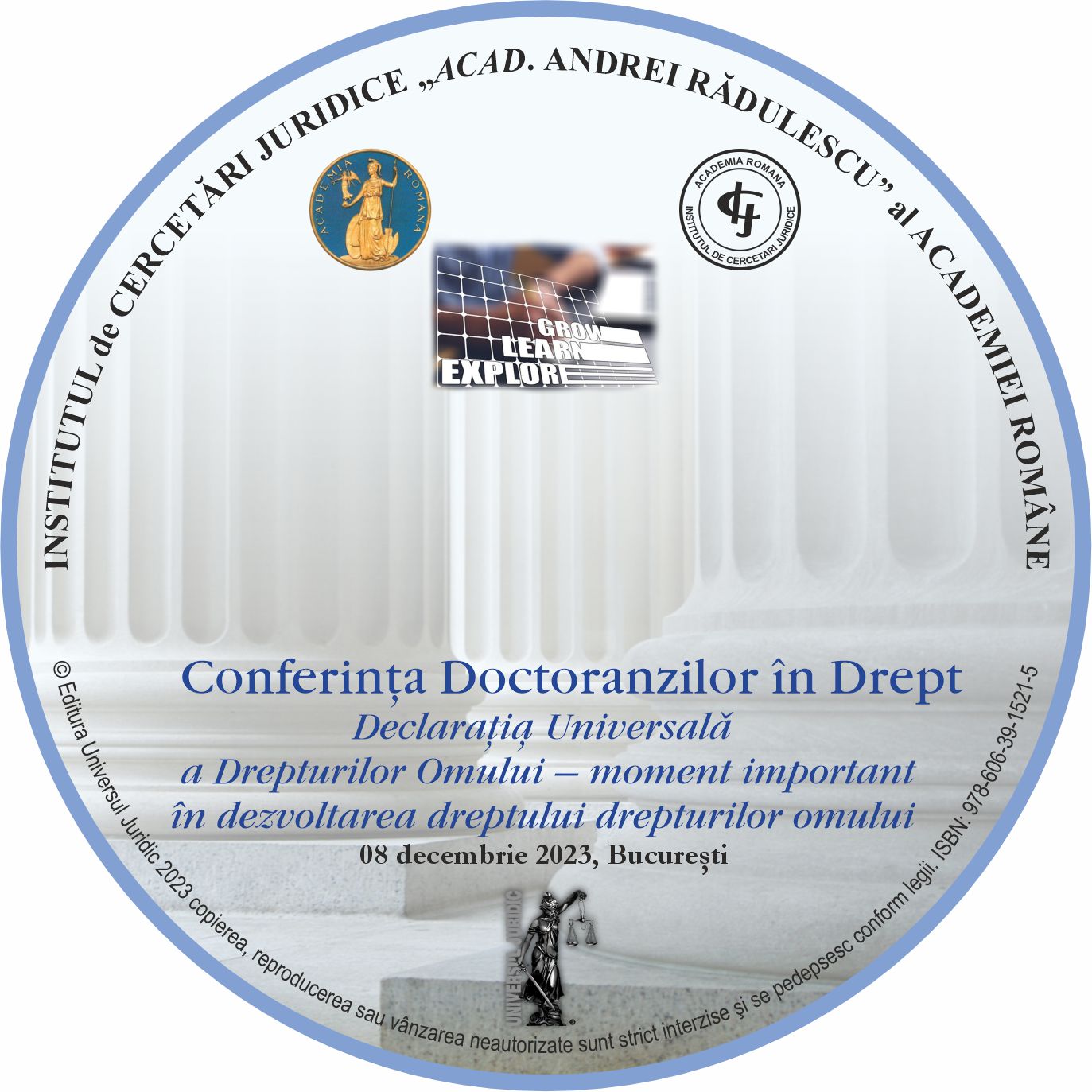
Although the prima facie functionality of the presumption of innocence in cases involving deprivation of liberty adheres to the parameters of legality, in practice, the probative standards outlining the coordinates of liberty-restrictive or rights-restrictive measures can readily engender a societal conviction that the individual subject to criminal proceedings is culpable of committing the offense. This inherent proclivity becomes conspicuously apparent in judicious junctures characterized by the prematurely postulated judicial intuition. The substantive concept of culpability, as an indispensable trait of an offense, conjoining volitional and cognitive aspects into a unified human representation of the repercussions of violating criminal law, is judiciously reflected in a procedural-legal concept of guilt. This concept is contingent on a tripartite determination on the part of the adjudicating body: the concrete act exists in its materiality, it legally constitutes a criminal offense (in the sense that it satisfies all the constituent elements of the typical incrimination model and has been committed with the requisite mens rea as prescribed by statutory law), and there exists an unequivocal nexus between the person who committed the specific act and the one arraigned for trial. The material foundation for ascertaining guilt at the legislatively mandated standard - beyond any shadow of reasonable doubt - resides in the presence of robust, legally sound, and faithfully administered probative evidence. Dubiety or incongruity impedes the subversion of the presumption of innocence, esteemed as a bulwark of the right to a just legal proceeding, as delineated by constitutional provisions, procedural-criminal edicts, international conventions, and reference instruments in the sphere of human rights preservation, such as the Universal Declaration adopted in 1948 by the member states of the United Nations General Assembly.
More...